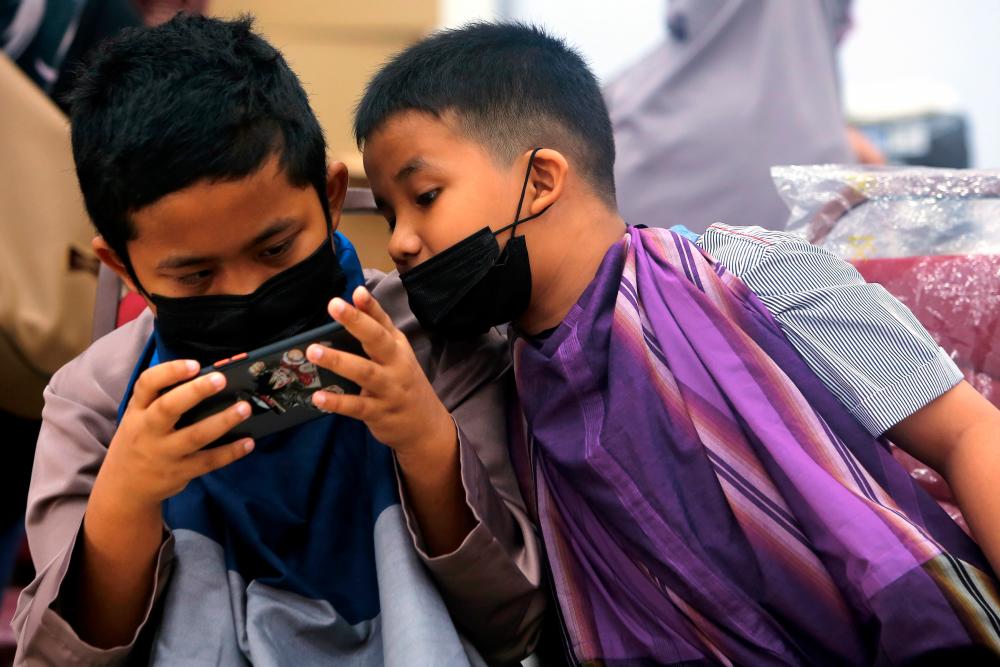PETALING JAYA: An ophthalmologist has warned parents to restrict the amount of time their children spend using mobile phones and tablets due to the risk of them developing poor eyesight or even going blind.
Putrajaya Hospital’s Dr Hafiza Izyani Yaacob said: “Myopia (shortsightedness) stands as one of the most prevalent issues when children are exposed to extended screen time.
“It is a growing concern, with its prevalence ranging from 9.8% at seven years old to 34.4% by age 15, leaving a 55% need for refractive correction that is still unmet.
“The Malaysian problem is part of a global trend, with myopia estimated to affect some five billion people worldwide by 2050, encompassing nearly half of the world’s population.”
Hafiza stressed that it is incorrect to assume children of all ages may receive the same amount of screen time as adults.
“To promote healthy screen habits among children, it is recommended that those under two years should not have access to digital gadgets.
“For children aged two to six, screen time should be limited to one hour per day under proper supervision.”
She said as children progress to the seven to 12 age group, a maximum of two hours per day with supervision is advised.
Those older than 12 should proactively reduce screen time, fostering a balanced and mindful approach to the use of digital devices.
Hafiza also commented on a joint study by Universiti Kebangsaan Malaysia and Universiti Pertahanan Nasional Malaysia published last year regarding the refractive error and visual impairment of primary schoolchildren.
The study showed that 80% of them had vision problems due to excessive screen time during the Covid-19 lockdown, with 60% being myopic and 16% hyperopic (far-sighted).
It also revealed that the children struggled with profound eyesight challenges, including cases of blindness, while others contended with different forms of vision issues.
The study further said one in 10 children suffered major vision issues, with excessive usage of digital smart devices being a key cause.
“Myopia stands as one of the most prevalent issues encountered when children are exposed to screens for extended periods,” Hafiza said.
She added that the high percentage of myopia carries an elevated risk of severe eye conditions, such as myopic maculopathy, retinal detachment, cataracts and glaucoma, which underlines the urgent need for proactive intervention and awareness.
“In the digital age, particularly since the advent of the Covid-19 pandemic, there has been a noticeable rise in myopia patients, and it is worrying that the majority of them are aged between seven and 15.
“This increase can be attributed to the prevalence of online education and the increased reliance on technology to occupy and entertain children.”
Hafiza stressed that if the problem continues, there may soon be an alarming increase in the number of preschool pupils who need corrective spectacles.
On steps to be taken to address the issue, she said parents should reduce their children’s screen time as the first step.
She said this should be accompanied by encouraging more outside activities and providing regular breaks from digital devices to promote good eyesight.
Clinical psychologist Kee Joey said excessive screen time also impacts children’s overall development.
“I wish to emphasise that excessive screen time, particularly during preschool years, can hinder cognitive function and language development due to reduced human interaction.
“It can also cause problems with their social and emotional growth, and cause sleep disorders, depression, anxiety and impaired emotional processing, which promote aggressive behaviour and degrade social skills,”
she added.
Kee also observed that it was common to see Malaysian parents giving their upset or crying children their smartphones and tablets as a way to calm
them down.
“Embracing this habit prolongs a child’s screen time and nurtures a persistent dependence on such devices, potentially undermining their long-term cognitive development,” she said.









